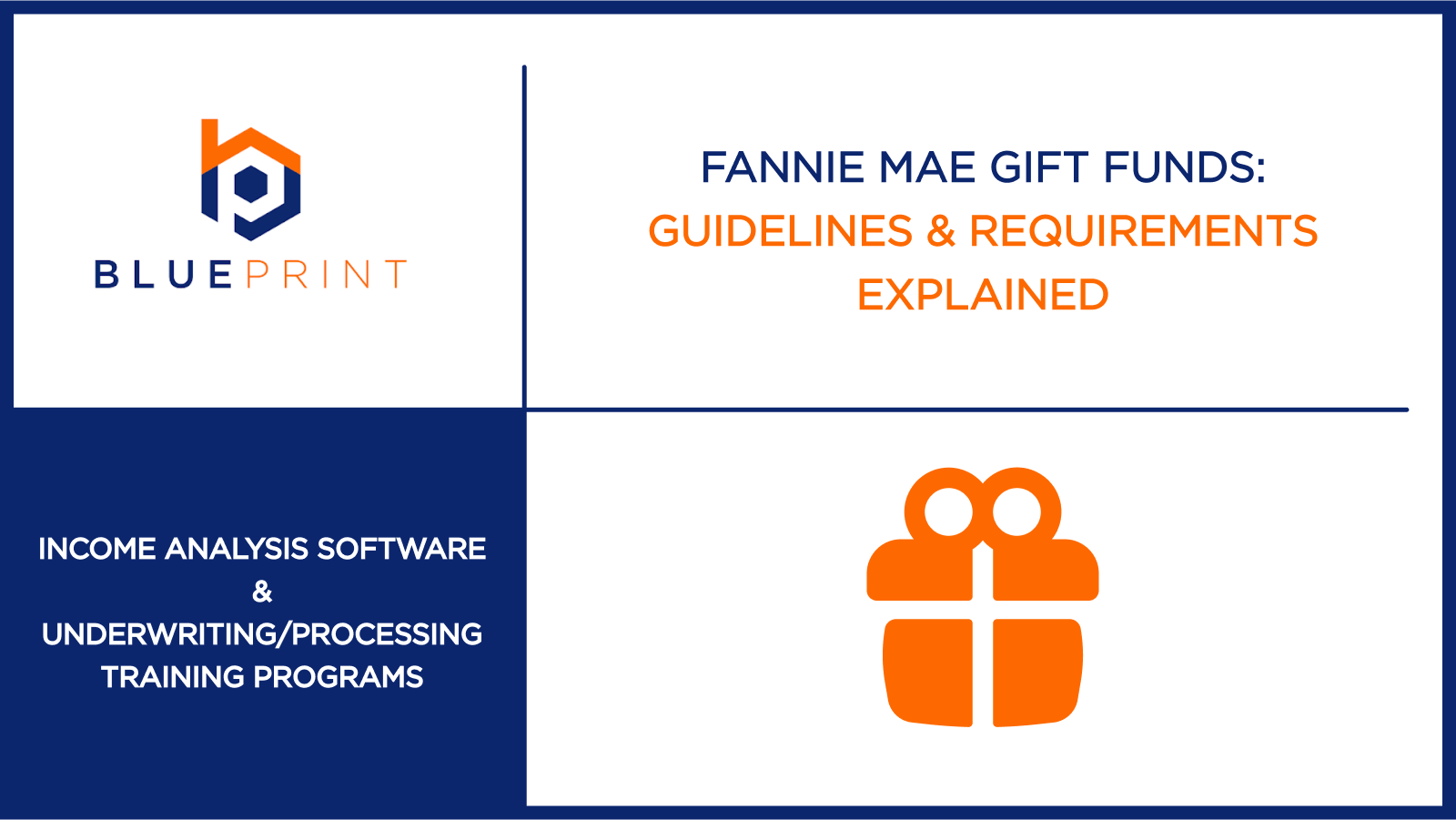Gift funds can be a valuable tool for helping borrowers meet down payment and closing cost requirements, especially when liquidity is a barrier to homeownership. Fannie Mae provides clear guidance on when gift funds are allowed, who can provide them, and acceptable documentation to ensure compliance.
For mortgage lenders, understanding the nuances of gift fund eligibility and documentation is critical to maintaining loan quality and meeting agency guidelines. This article outlines the key rules, acceptable donor relationships, and documentation standards for using gift funds in Fannie Mae loans, along with frequently asked questions to help underwriting teams apply these guidelines consistently.
Main takeaways from this article:
- Fannie Mae gift funds can help cover down payments and closing costs through financial gifts from eligible sources.
- Eligible donors for gift funds include family members, fiancés, and domestic partners.
- When using gift funds, detailed documentation is crucial, including a gift letter, evidence of transfer (such as a borrower’s deposit slip showing the funds received), and proof of donor funds.
- While gift funds can contribute to down payments, their use for reserves is limited and subject to automated underwriting system guidelines.
- IncomeXpert offers tools to assist lenders in verifying and documenting income sources in compliance with Fannie Mae requirements.
What are Fannie Mae gift funds?

Fannie Mae gift funds are financial contributions given to a borrower to assist with the purchase of a home. These funds can be used toward the down payment, closing costs, or financial reserves, making homeownership more accessible.
Who is considered an eligible donor?

Fannie Mae has specific guidelines regarding who can provide gift funds. Acceptable donors include:
- Family members: This category includes close relatives, such as a spouse, children, and other dependents. Individuals related by blood, marriage, or adoption are also considered eligible donors under Fannie Mae’s policies. These familial connections establish a clear and acceptable relationship for the provision of gift funds.
- Fiancé(e) or domestic partner: Individuals who are engaged to marry the borrower or who share a domestic partnership with the borrower are also recognized as acceptable sources for gift funds.
- Legal guardians: Individuals who have been legally appointed as the guardian of the borrower are permitted to provide gift funds.
Note: Gift funds from individuals or entities with a vested interest in the home purchase transaction are not acceptable. This includes parties such as builders, developers, real estate agents, or anyone else who stands to gain financially from the sale. This restriction aims to prevent conflicts of interest and ensure the integrity of the lending process.
Acceptable uses for Fannie Mae gift funds

Fannie Mae gift funds offer borrowers valuable flexibility in managing the costs associated with purchasing a home. These funds can be directed toward:
Down payment on a primary residence
Gift funds can directly contribute to the portion of the home’s purchase price that the borrower pays upfront. This can lower the loan amount for down payment requirements and potentially reduce monthly mortgage payments.
Closing costs
These cover the various fees associated with finalizing the home purchase, such as appraisal and inspection fees, taxes, and lender charges. Using gift funds for these expenses can alleviate the immediate out-of-pocket costs beyond the down payment.
Financial reserves (if allowed by AUS)
Depending on the AUS assessment of the loan application, borrowers may be required to have a certain amount of liquid assets remaining after closing. Gift funds can, in some instances, be used to satisfy these reserve requirements, providing an additional layer of financial security.
Documentation requirements for gift funds

Proper documentation is required when using gift funds for a home purchase to meet Fannie Mae’s requirements and ensure a smooth loan process. Lenders will typically require the following paperwork:
Gift letter
This is a formal written statement from the donor to the borrower. It must clearly state the donor’s name, address, and relationship to the borrower. The exact amount of the gift should be specified, along with a confirmation that the funds are indeed a gift and not a loan with an expectation of repayment. The letter must be signed and dated by the donor.
Evidence of transfer
Documentation showing that the gift funds have moved from the donor to the borrower is necessary. Acceptable forms of evidence include a copy of the donor’s canceled check, a bank statement showing the electronic transfer from the donor’s account to the borrower’s account, or a copy of a money order. This confirms the transfer of funds has occurred.
The settlement statement showing receipt will also serve as confirmation that the funds were received and applied to the transaction.
Proof of the donor’s availability of funds
When using Fannie Mae gift funds, lenders may ask for documentation demonstrating the donor has sufficient funds. This could include bank statements or other financial records for the donor. Having this documentation available and providing it to the lenders can help expedite the underwriting process.
Ensure total documentation clarity with IncomeXpert
Maintaining thorough and accurate documentation is paramount when using Fannie Mae gift funds. Following the specific requirements for gift letters, evidence of transfer, and proof of donor funds helps ensure a transparent and compliant loan process. By carefully managing these details, borrowers and lenders can work towards a smoother transaction.
For lenders seeking to enhance the clarity and accuracy of their overall documentation processes, particularly concerning income verification, IncomeXpert offers a valuable solution. The tool assists lenders in thoroughly reviewing and confirming income sources, which plays a vital role in the overall loan assessment when gift funds are part of the equation.
While gift fund documentation requires careful attention, having an automated system for income verification adds another layer of confidence and clarity to the entire process.

